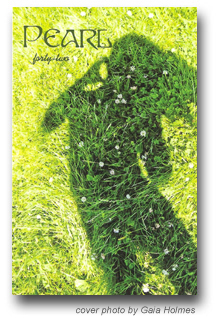Verdad Magazine Volume 9
Fall 2010, Volume 9
Interview with Marilyn Johnson, Editor of Pearl Magazine
Verdad: Pearl has been a Long Beach literary staple for quite some time. How many editions has Pearl put out?
Marilyn Johnson: Yes, Pearl was founded by Joan Jobe Smith back in 1974, but folded after three issues for lack of funding. With the advent of personal computers, we reprised the magazine in 1987 and are about to come out with issue #43.
V: Do you have a favorite edition?
MJ: I would have to say Pearl #12, our 1990 "Marilyn Monroe Issue." As a tribute to what would have been her 64th birthday, we originally planned on a special section featuring a small number of poems written to and about her. But the response to our call for submissions was so overwhelming, we ended up devoting almost the entire issue to over 70 of the Marilyn Monroe poems we received. This issue was so popular, it completely sold out within just a few months!
V: What type of writing does Pearl especially look for?
MJ: We look for readable, accessible poetry and fiction that speaks to real people about real life in direct, living language. We have no problem with subtlety, but we're not interested in obscure, experimental writing that makes little or no sense. In poetry, we are always on the lookout for humor and wit, as well as short, pithy poems that make some kind of provocative statement. We're also particularly interested in insightful "political" poems that comment on society and the state of the world right now. In fiction, we look for coherent, well-crafted narratives, containing interesting, believable characters and meaningful situations our readers can identify with.
V: What is your favorite thing about being the editor of Pearl?
MJ: Designing and putting together the magazine—especially the poetry issues. I always feel like I'm composing a symphony—a sweep of poems ranging through a wide variety of subjects that interconnect, yet constantly shift and open into something new—the serious and lyrical leading to the clever and witty, to the loud and caustic, the quiet and poignant, and so on. Most other literary magazines seem to arrange their poems in a more or less random order—or sometimes alphabetically by the authors' last names, which is essentially the same thing. It's a lot easier and less time-consuming to put together a magazine this way, but I want each issue of Pearl to be more than a sum of its parts—a distinct whole with an overall feeling and identity of its own.
V: What trends do you see forthcoming in the world of small presses?
MJ: As the electronic media continues to supplant the printed page, I see the small press leaning more and more toward online publishing—especially now with donor and grant money drying up. Small independent publishers like Pearl, which have never depended on outside sources and know how to operate on meager, shoestring budgets, have the best chances of surviving the economic downturn and what I see as a transitional period for publishing in general.
V: What trends do you see forthcoming in the genres of fiction and poetry?
MJ: With poetry all over the map in terms of language, form, intent, and audience, there still seem to be two main trajectories. One goes back to Whitman and Ginsberg—raw, visceral, outspoken poetry, socially engaged and rooted in time, place, and experience. The other goes back to T.S. Eliot—conservative, traditional poetry, oblique and refined, and more concerned with larger metaphysical questions and matters of transcendence and redemption.
As for fiction, the short story is alive and well, if only in the small literary press, and flash fiction and the short-short story have been gaining in popularity for a number of years now. The scope of the novel, which in recent times has become increasingly small, now seems to be expanding. In contrast to the limits of time and place that circumscribe such modest, interior novels as Ian McEwan's On Chesil Beach, we are now seeing "big books" again—decade-sweeping novels like Private Life and Jonathan Franzen's Freedom and The Corrections.
V: Tell us the best books you have read this year.
MJ: I'm prejudiced, of course, since I have a personal connection to the authors, but the three knockout poetry collections I read this year are Hammers and Hearts of the Gods by Fred Voss, Modern History: Prose poems 1987-2007 by Christopher Buckley, and Animal Magnetism by Kim Roberts, winner of last year's Pearl Poetry Prize. The best novels I've read this year are Smiley's Private Life, Franzen's Freedom (the first book I bought to read on my new Kindle!), and The Brief Wondrous Life of Oscar Wao by Junot Díaz.
 BIO: Marilyn Johnson is one of the editors of Pearl, the oldest literary magazine in Long Beach. She is the author of A Necessary Fire, a book of poetry, and has been anthologized in A New Geography of Poets (University of Arkansas Press), I Am Becoming the Woman I've Wanted (Papier-Mache Press), Always the Beautiful Answer: A Prose Poetry Primer (Kings Estate Press), and Some for the Road: Poems for Gerald Locklin (World Parade Books). She taught writing at California State University, Long Beach, until her retirement in 2001.
BIO: Marilyn Johnson is one of the editors of Pearl, the oldest literary magazine in Long Beach. She is the author of A Necessary Fire, a book of poetry, and has been anthologized in A New Geography of Poets (University of Arkansas Press), I Am Becoming the Woman I've Wanted (Papier-Mache Press), Always the Beautiful Answer: A Prose Poetry Primer (Kings Estate Press), and Some for the Road: Poems for Gerald Locklin (World Parade Books). She taught writing at California State University, Long Beach, until her retirement in 2001.
